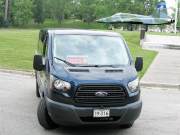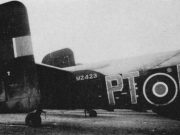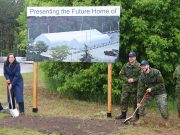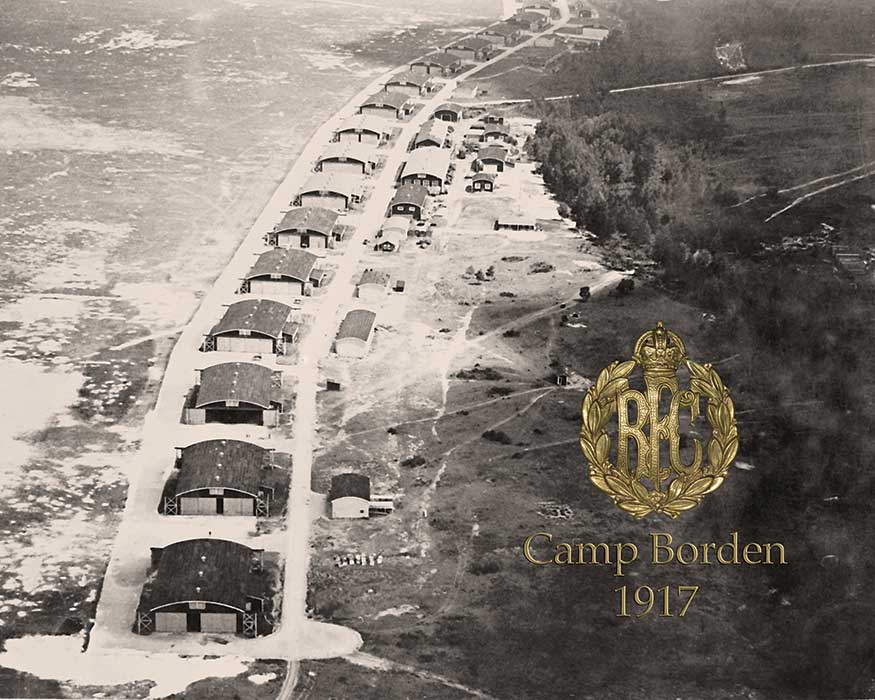RCAF marks 100th anniversary of first military pilot training in Canada
By / Par National Defence and Canadian Armed Forces / Ministère de la Défense nationale et Forces armées canadiennes
In 2017, the Royal Canadian Air Force is marking the 100th anniversary of the first military pilot training in Canada.
The Royal Flying Corps Canada (RFCC) was established in late January 1917 to recruit and train Canadians for service in the RFC during the First World War. The first purpose-built and largest military aerodrome was constructed at Camp Borden, near Barrie, Ontario, in little more than two months. The first cadets arrived there for training on March 28, 1917, and the first flight took place on March 30, 1917.
The RFCC provided the first military pilot training to take place in Canada. Previously, Canadians who wanted to join the RFC generally transferred from the Army or obtained a basic flying certificate from a private company and then travelled to Great Britain in hopes of being selected. In the same manner, Canadians who wanted to join the Royal Naval Air Service had to qualify as a pilot before enlisting.
Although the program was run by military staff from Great Britain, by the time the Armistice was declared on November 11, 1918, it was Canadian in all but name. An estimated 70 per cent of the instructors and a large percentage of the non-flying staff were Canadians. As well, the training program employed the Canadian-built JN-4 aircraft, built by Canadian Aeroplanes Limited with an engine manufactured in the United States.
Furthermore, the training program influenced the establishment of the British Commonwealth Air Training Plan (BCATP), arguably Canada’s most important contribution to the Second World War. However, this organization, unlike its First World War counterpart, would be developed administered and commanded entirely by Canadians.
“The Royal Flying Corps Canada, established only eight years after Canada’s first controlled, powered, heavier-than-air flight took place in Baddeck, Nova Scotia, had a powerful effect on ‘airmindedness’ in Canada,” stated Lieutenant-General Michael Hood, Commander, Royal Canadian Air Force. “Air and ground crew came from across Canada as our nation undertook, for the first time in its history, a complex aviation project that included both manufacturing and training. As we mark the 100th anniversary of the program, we honour the service and sacrifice of the Canadian pilots who took their skills to Europe and eventual victory, as well as the service of the men and women who worked as instructors, groundcrew and support staff during this ground-breaking program.”
Commemoration of the RFCC / RAFC will centre on 16 Wing Borden, Ontario. Events will include a memorial service on April 7 at Dorchester, Ontario, for the first cadet killed during training at Camp Borden and the rededication of a memorial cairn and open house at CFB Borden on June 3. More information about these events will be forthcoming.
L’ARC célèbre le centenaire du premier cours de pilotage militaire au Canada
En 2017, l’Aviation royale canadienne marquera le 100e anniversaire du premier programme de formation de pilotes militaires au Canada.
Le Royal Flying Corps Canada (RFCC) voit le jour à la fin de janvier 1917. Grâce à lui, on souhaite recruter des Canadiens et les préparer à leur service dans le Royal Flying Corps (RFC) pendant la Première Guerre mondiale. Un aérodrome militaire, le premier et le plus grand à être conçu à cette fin, est construit au camp Borden, près de Barrie, en Ontario, en à peine plus de deux mois. Les premiers cadets y amorcent leur formation le 28 mars 1917, et un premier vol y a lieu le 30 mars 1917.
Le RFCC donne le tout premier cours de pilotage militaire au Canada. Avant la création du RFCC, les Canadiens qui voulaient se joindre au RFC devaient passer par l’Armée ou obtenir un certificat de pilotage de base d’une entreprise privée et se rendre en Grande-Bretagne en espérant être retenus. De même, les Canadiens qui souhaitaient s’enrôler dans le Royal Naval Air Service (RNAS) devaient suivre leur formation de pilote avant de s’enrôler.
Bien que des militaires britanniques dirigent le programme, au moment de la signature de l’Armistice, le 11 novembre 1918, il est en tout point canadien, à l’exception de son nom. On estime que 70 p. 100 des instructeurs et qu’un haut pourcentage du personnel au sol sont d’origine canadienne. De plus, l’avion JN-4, construit au Canada par Canadian Aeroplanes Limited et équipé d’un moteur fabriqué aux États-Unis, sert d’aéronef d’entraînement dans le cadre du programme.
De plus, le programme influe sur l’établissement du Programme d’entraînement aérien du Commonwealth britannique (PEACB), sans doute la plus grande contribution du Canada à la Seconde Guerre mondiale. Toutefois, le PEACB, contrairement à son pendant de la Première Guerre mondiale, sera créé, administré et dirigé uniquement par des Canadiens.
« Le Royal Flying Corps du Canada, établi seulement huit ans après le premier vol canadien d’un appareil motorisé manœuvrable plus lourd que l’air, à Baddeck, en Nouvelle-Écosse, a eu un effet puissant sur la « mentalité aéronautique » au Canada, » a dit le lieutenant-général Michael Hood, commandant de l’Aviation royale canadienne. « Des membres d’équipages et du personnel de piste de partout au Canada se sont rassemblés lorsque notre pays a entrepris, pour la première fois dans son histoire, un projet d’aviation complexe comprenant les aspects de la fabrication et de l’instruction. À l’occasion du centenaire de ce programme, nous rendons hommage au service et au sacrifice des pilotes canadiens dont les compétences les ont menés en Europe, puis à la victoire, ainsi qu’au service des hommes et des femmes qui ont travaillé comme instructeurs, membres du personnel au sol et membres du personnel de soutien dans le cadre de ce programme révolutionnaire. »
La commémoration du Royal Flying Corps Canada et de la Royal Air Force Canada se déroulera principalement à la 16e Escadre Borden, en Ontario. Les activités comprendront un service commémoratif qui se tiendra le 7 avril, à Dorchester, en Ontario, en l’honneur du premier cadet tué pendant un entraînement au camp Borden, ainsi que la ré-inauguration d’un monument et une activité portes ouvertes à la BFC Borden le 3 juin. D’autres informations sur ces activités seront publiées ultérieurement.











